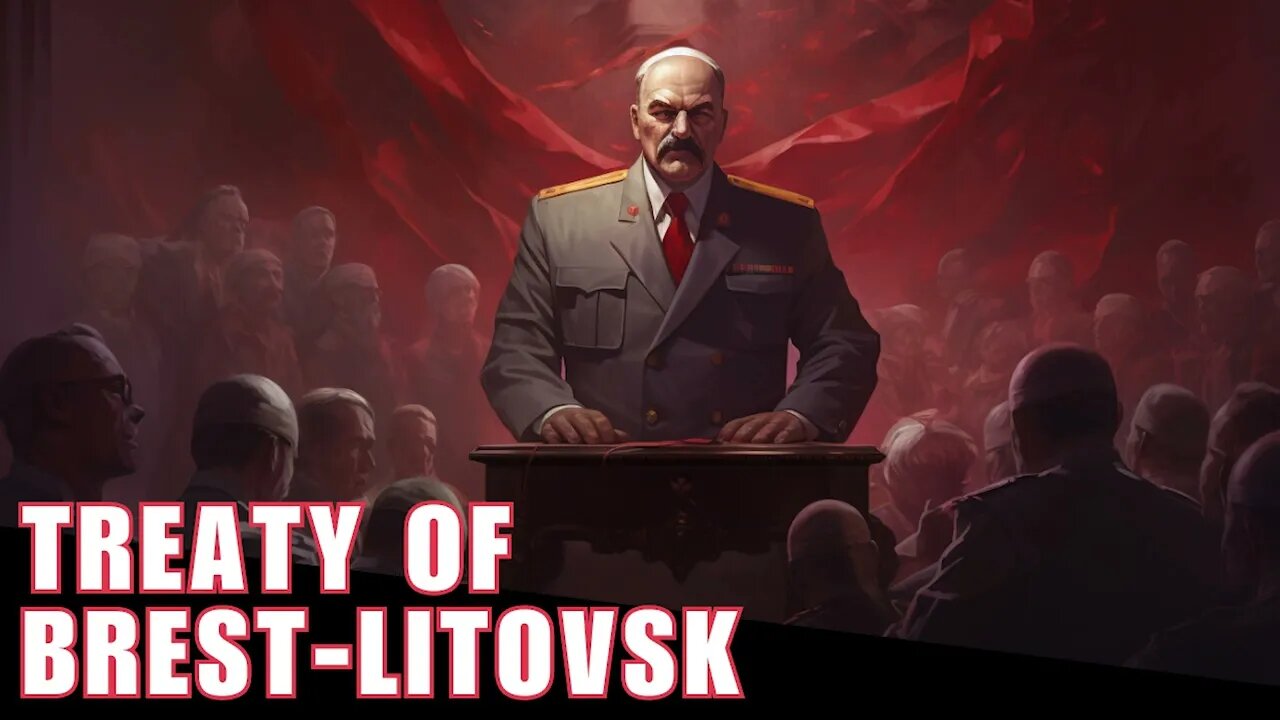Premium Only Content

The Treaty of Brest-Litovsk - A Turning Point in World War I and the Russian Revolution
Explore the pivotal Treaty of Brest-Litovsk, a critical chapter in World War I and the Russian Revolution. Discover the historical significance and consequences of this treaty, as it reshaped the map of Eastern Europe. Join us on a journey through this dramatic moment in history.
===============================
SUBSCRIBE TO THIS CHANNEL FOR MORE WORLD WAR STORIES:
https://www.youtube.com/@worldwarstory
===============================
TIMESTAMPS:
0:05 - Chapter 1: The Russian Revolution
0:39 - Chapter 2: The Outbreak of World War I
1:02 - Chapter 3: Negotiating Peace
1:29 - Chapter 4: The Harsh German Demands
1:53 - Chapter 5: The Soviet Dilemma
2:17 - Chapter 6: The Treaty of Brest-Litovsk
2:46 - Chapter 7: Consequences and Backlash
3:15 - Chapter 8: Legacy and Aftermath
Treaty of Brest-Litovsk:
The Treaty of Brest-Litovsk, signed in 1918, marked a pivotal moment in history as it resulted in the loss of significant Russian territories to the Central Powers, reshaping the map of Eastern Europe and redrawing national boundaries. This treaty was seen by many as a controversial move by the Bolshevik government, and the harsh terms imposed by the Central Powers had long-lasting consequences for the region.
Russian Revolution:
The Russian Revolution of 1917 was a defining moment in Russia's history as it led to the overthrow of the Romanov monarchy and the rise of the Bolsheviks. This revolution was characterized by a series of uprisings and political changes, with key figures like Vladimir Lenin and Leon Trotsky playing vital roles. The Russian Revolution had a profound impact on the global political landscape.
World War I:
World War I, also known as the Great War, was a global conflict that lasted from 1914 to 1918, involving many of the world's major powers with alliances forming the Central Powers and the Allies. The war, marked by trench warfare, technological innovations, and a high human cost, was triggered by the assassination of Archduke Franz Ferdinand of Austria-Hungary. The Treaty of Versailles formally ended World War I in 1919.
Historical significance:
Historical significance refers to the importance and impact of an event, person, or object in history. Historians assess the historical significance of events based on their long-term consequences, helping us understand the forces that have shaped the world. Recognizing historical significance is essential for comprehending the broader context of our world, where events like the moon landing have immense historical significance due to their influence on space exploration.
Eastern Europe history:
Eastern Europe's history is a tapestry of diverse cultures, empires, and conflicts. The region's history includes the rise and fall of powerful empires like the Ottoman and Austro-Hungarian. It's marked by the struggles for independence and self-determination, and the end of the Cold War had a profound impact on Eastern Europe, leading to the collapse of communist regimes. Studying Eastern Europe's history provides insights into the complex dynamics of the region.
Disclaimer:
In our Bio - https://www.youtube.com/@worldwarstory
#BrestLitovskTreaty #RussianRevolution #WorldWarIHistory #TreatyOfBrestLitovsk #HistoricalTurningPoint
-
 5:13
5:13
World War Stories
1 year ago $0.02 earnedBridging the Gap: The Battle of Nijmegen in Operation Market Garden
248 -
 LIVE
LIVE
Right Side Broadcasting Network
3 hours agoLIVE: White House Press Secretary Karoline Leavitt Holds a Press Briefing - 8/28/25
2,203 watching -
 LIVE
LIVE
Sean Unpaved
1 hour agoColt Knost Unplugged: Golf, 2025 Ryder Cup, & Football Fever
39 watching -
 LIVE
LIVE
Viss
1 hour ago🔴LIVE - Stacking Wins is What We Do! - PUBG Tactics 101
90 watching -
 LIVE
LIVE
The Charlie Kirk Show
39 minutes agoShould Taylor Swift Submit? + What's Wrong In Minneapolis? + MAHA vs. CDC | 8.28.2025
2,722 watching -
 LIVE
LIVE
Law&Crime
4 hours ago $0.01 earnedLIVE: Adelson Matriarch Murder Trial — FL v. Donna Adelson — Day 5
920 watching -
 LIVE
LIVE
The Mel K Show
51 minutes agoMORNINGS WITH MEL K - Refusing the Lie & Standing Firmly for Truth 8-28-25
613 watching -
 LIVE
LIVE
The Shannon Joy Show
2 hours ago🔥🔥BREAKING: FOIA’d Government Docs Reveal American Citizens Might Be Worth More DEAD Than Alive. Exclusive With Sasha Latypova! 🔥🔥
200 watching -
 LIVE
LIVE
Trumpet Daily
50 minutes agoTrumpet Daily LIVE | Aug. 28, 2025
431 watching -
 37:36
37:36
Nikko Ortiz
1 hour agoLive - Reaction Time, News, Politics, and More!
12.5K